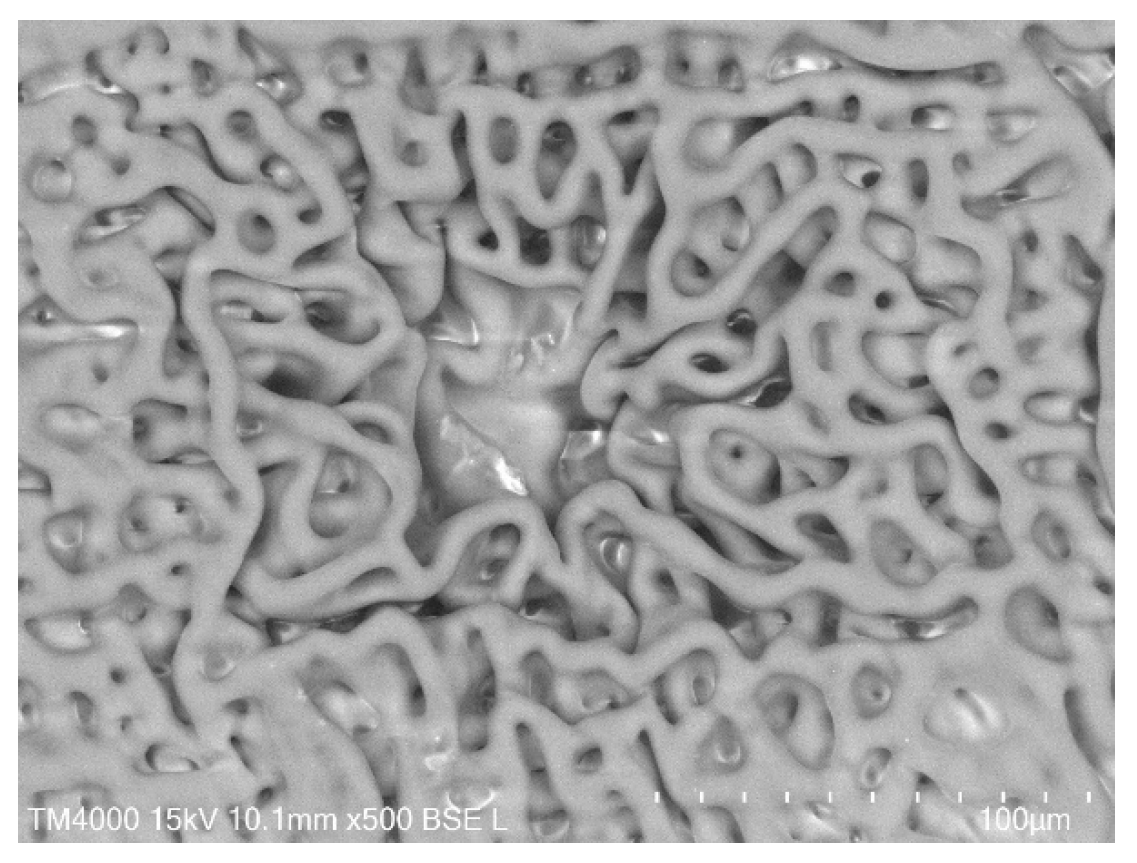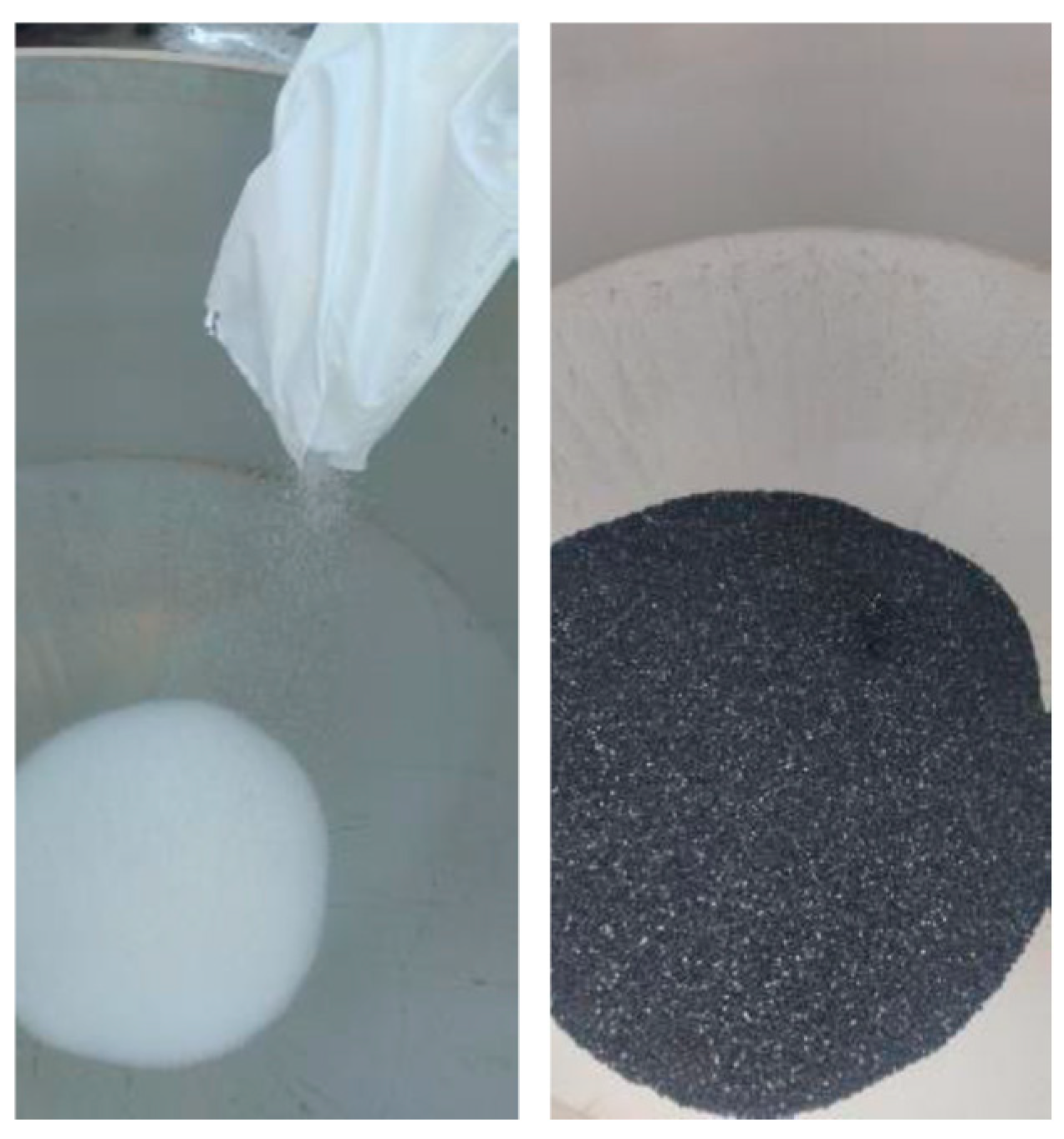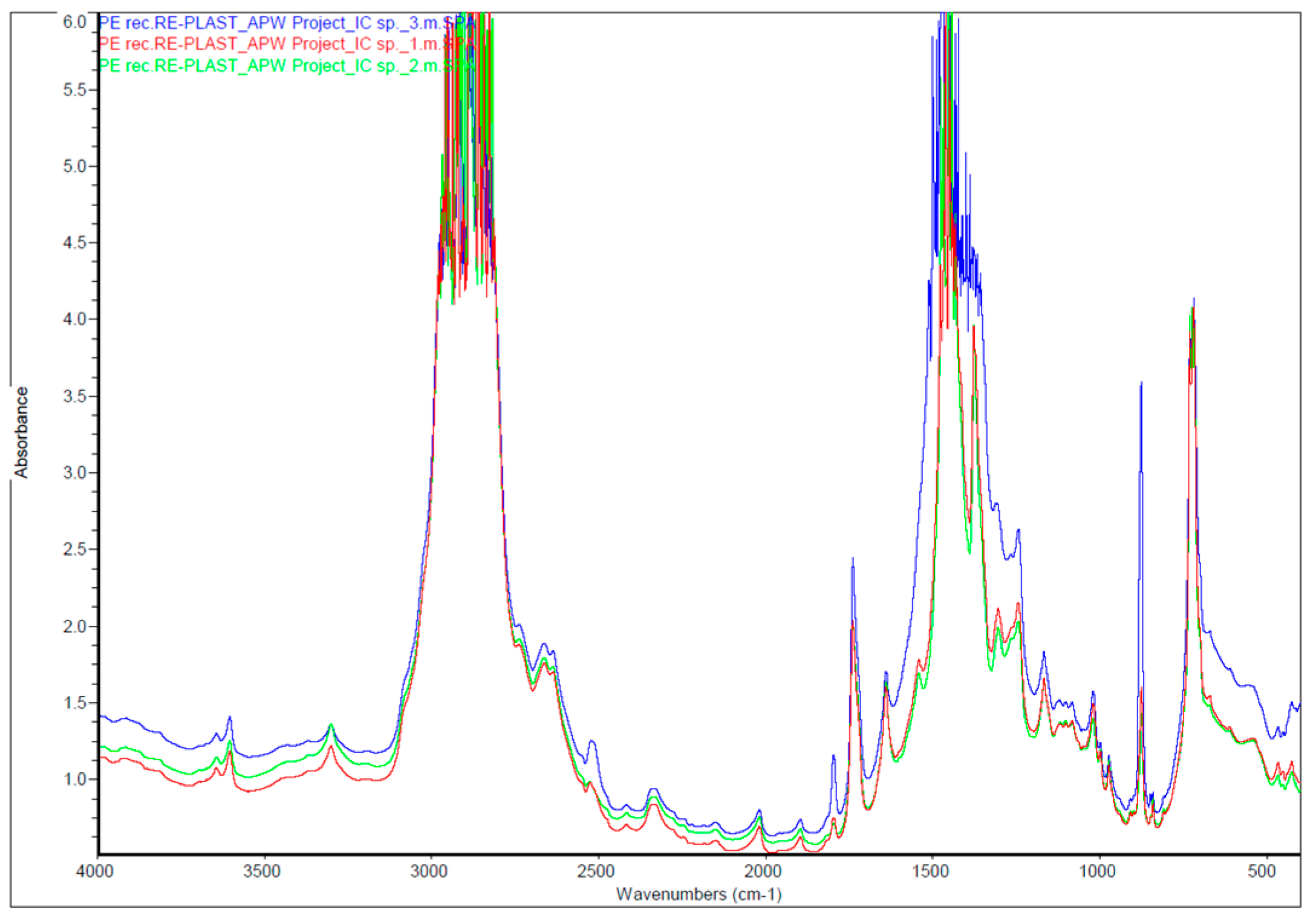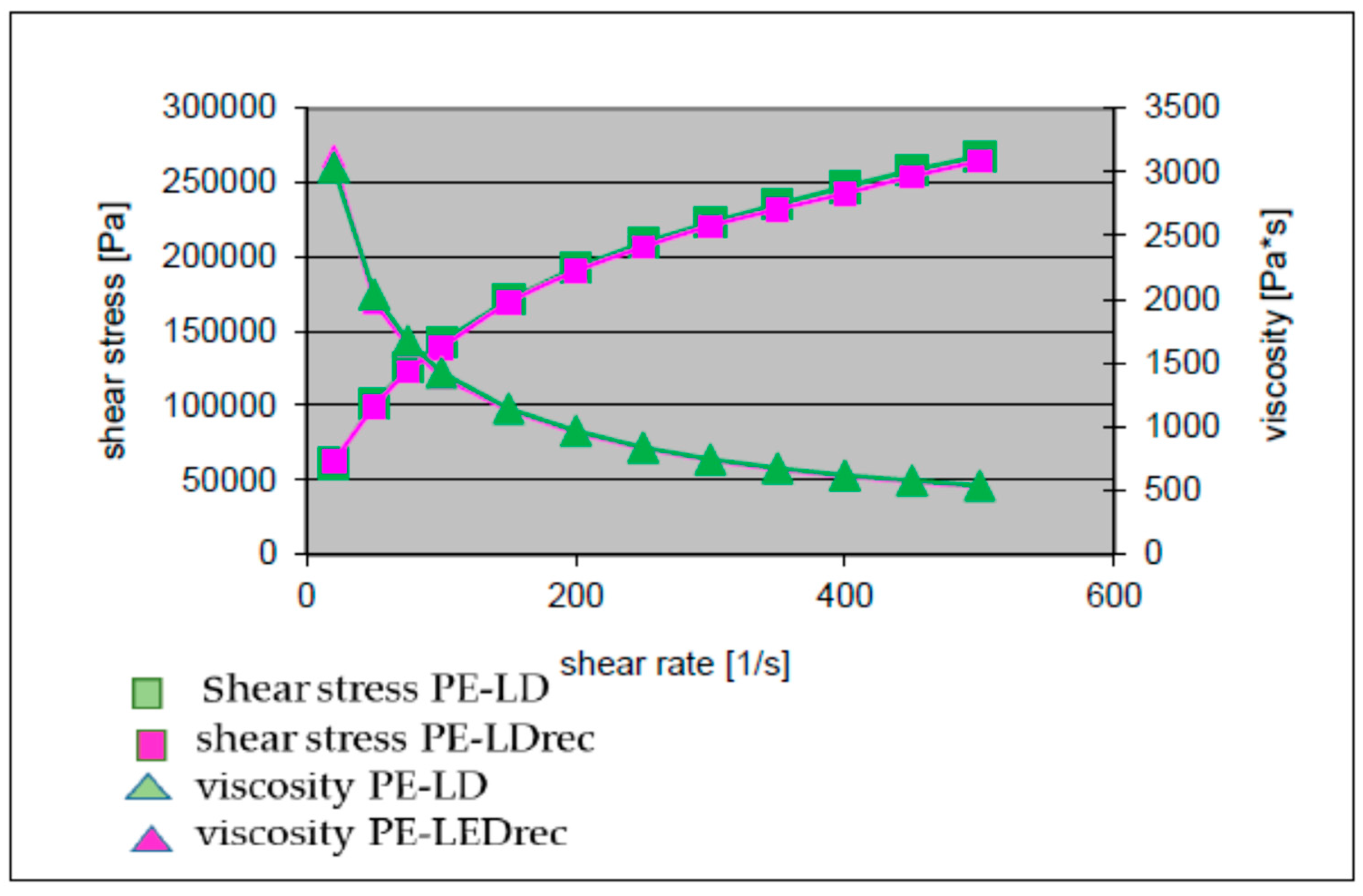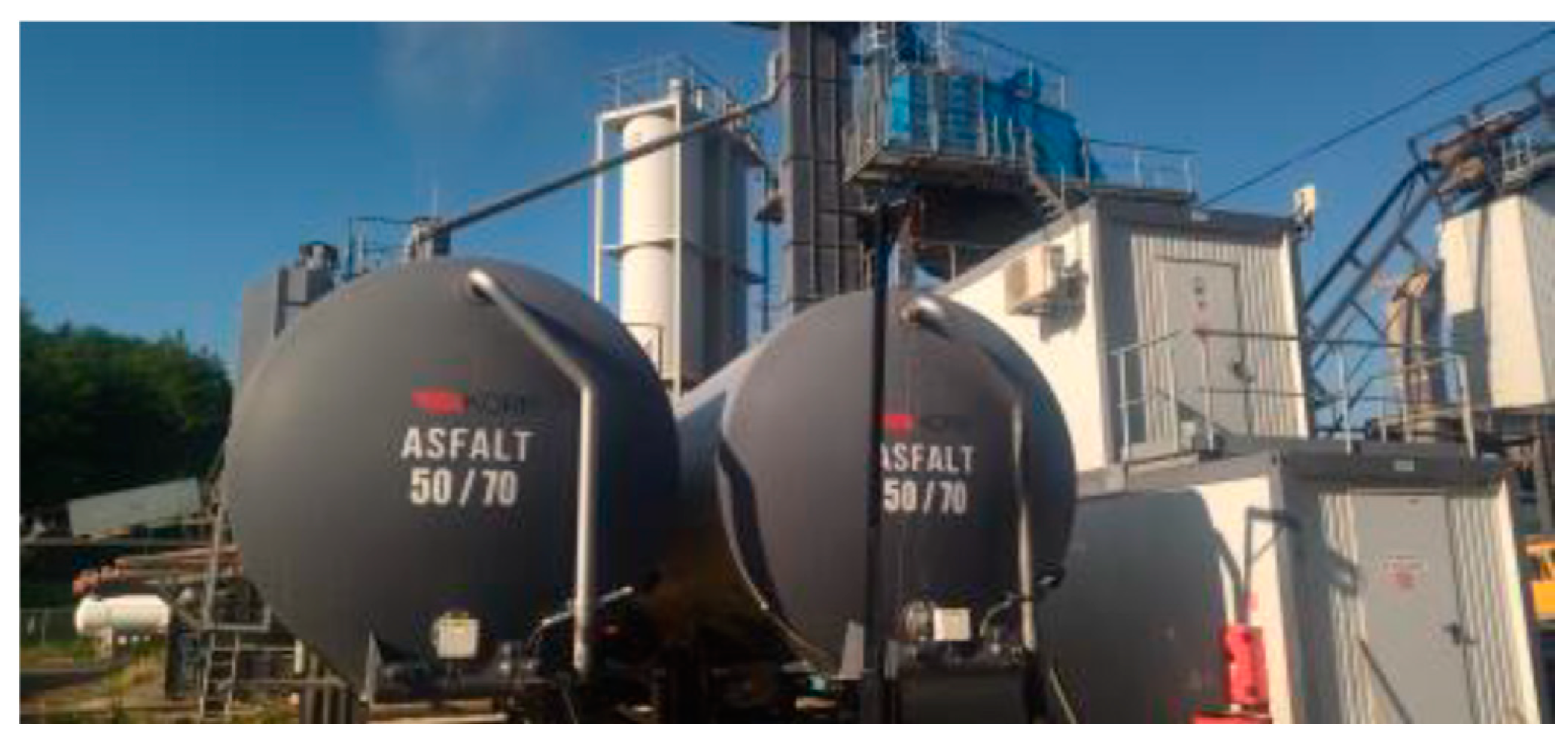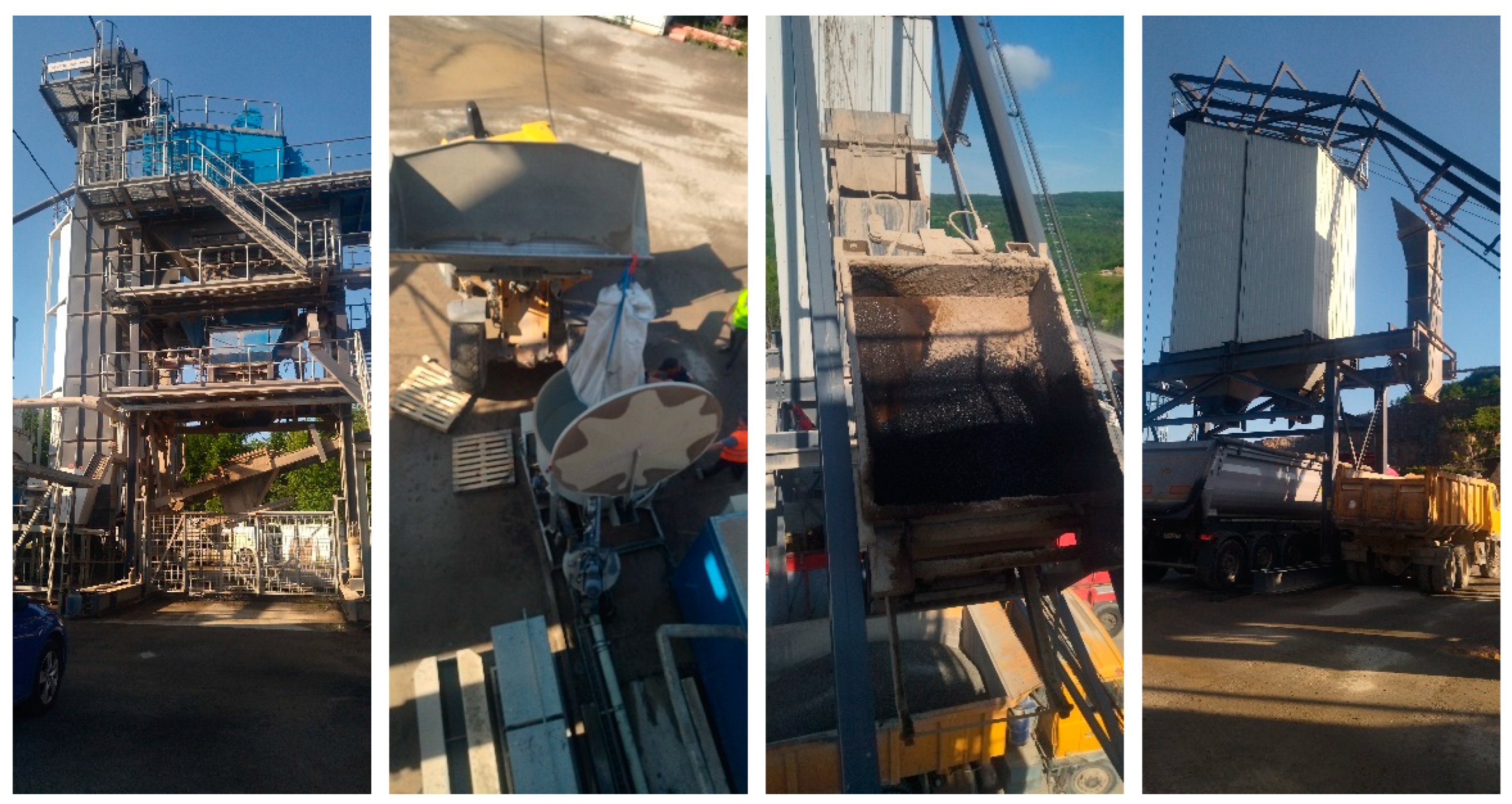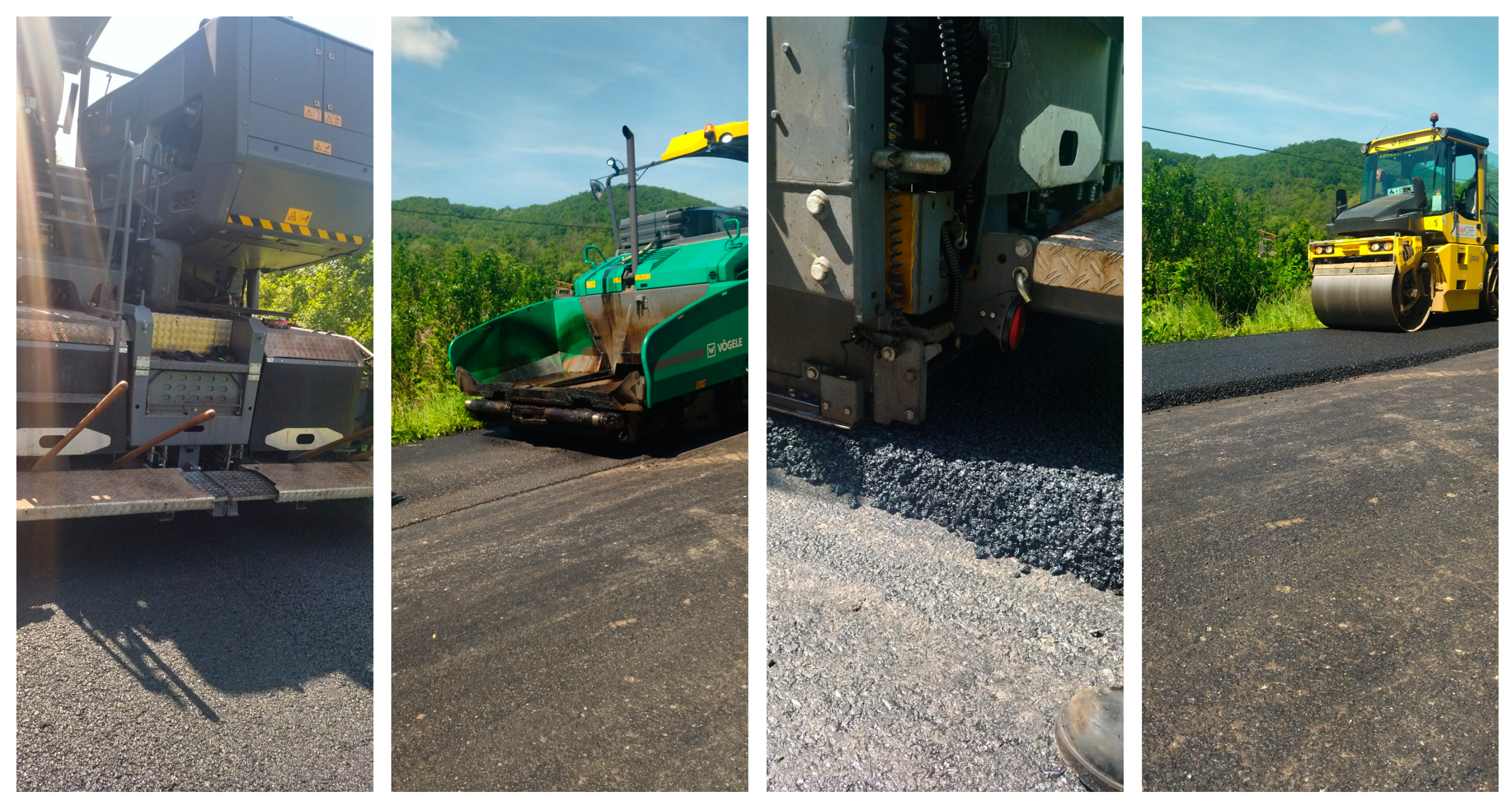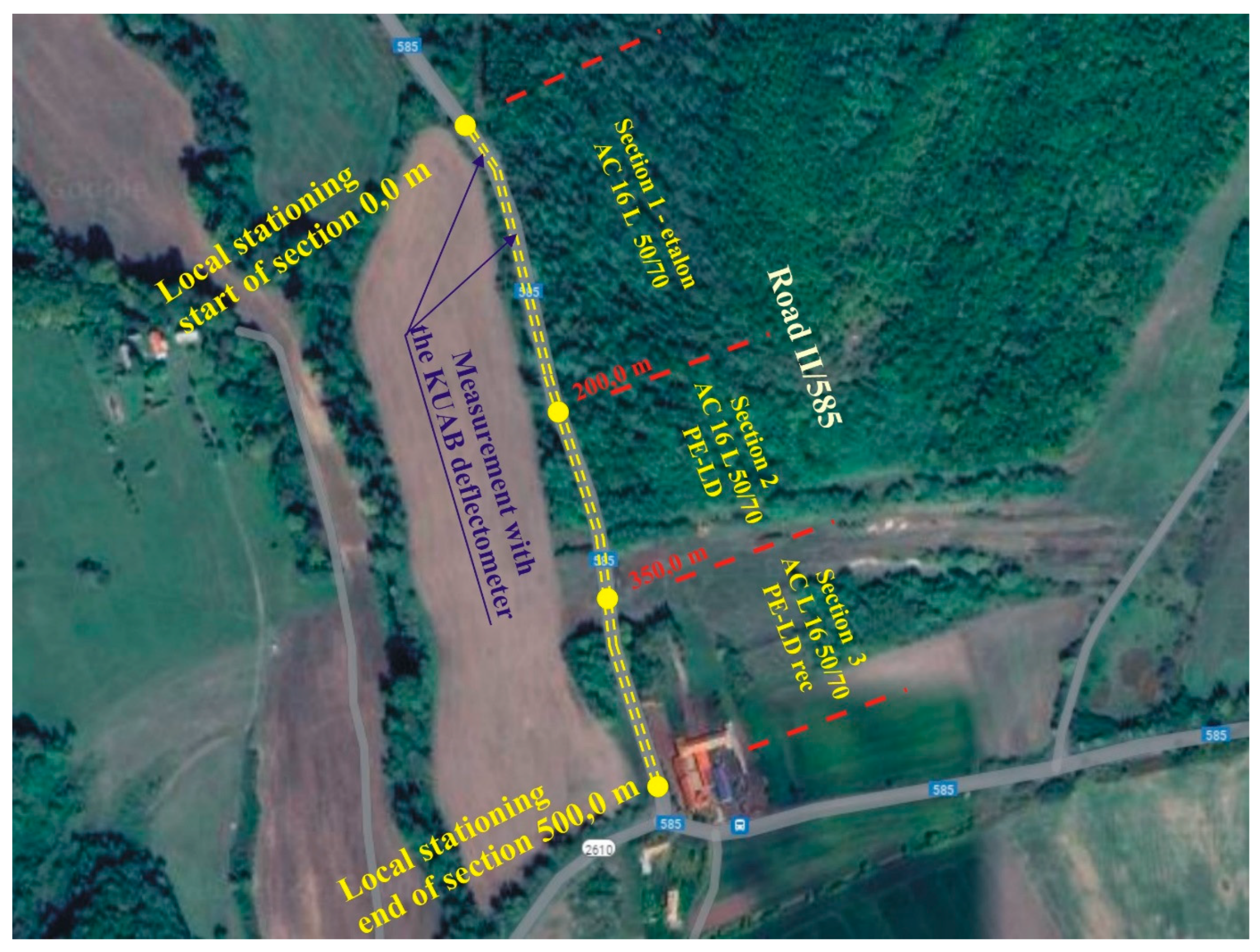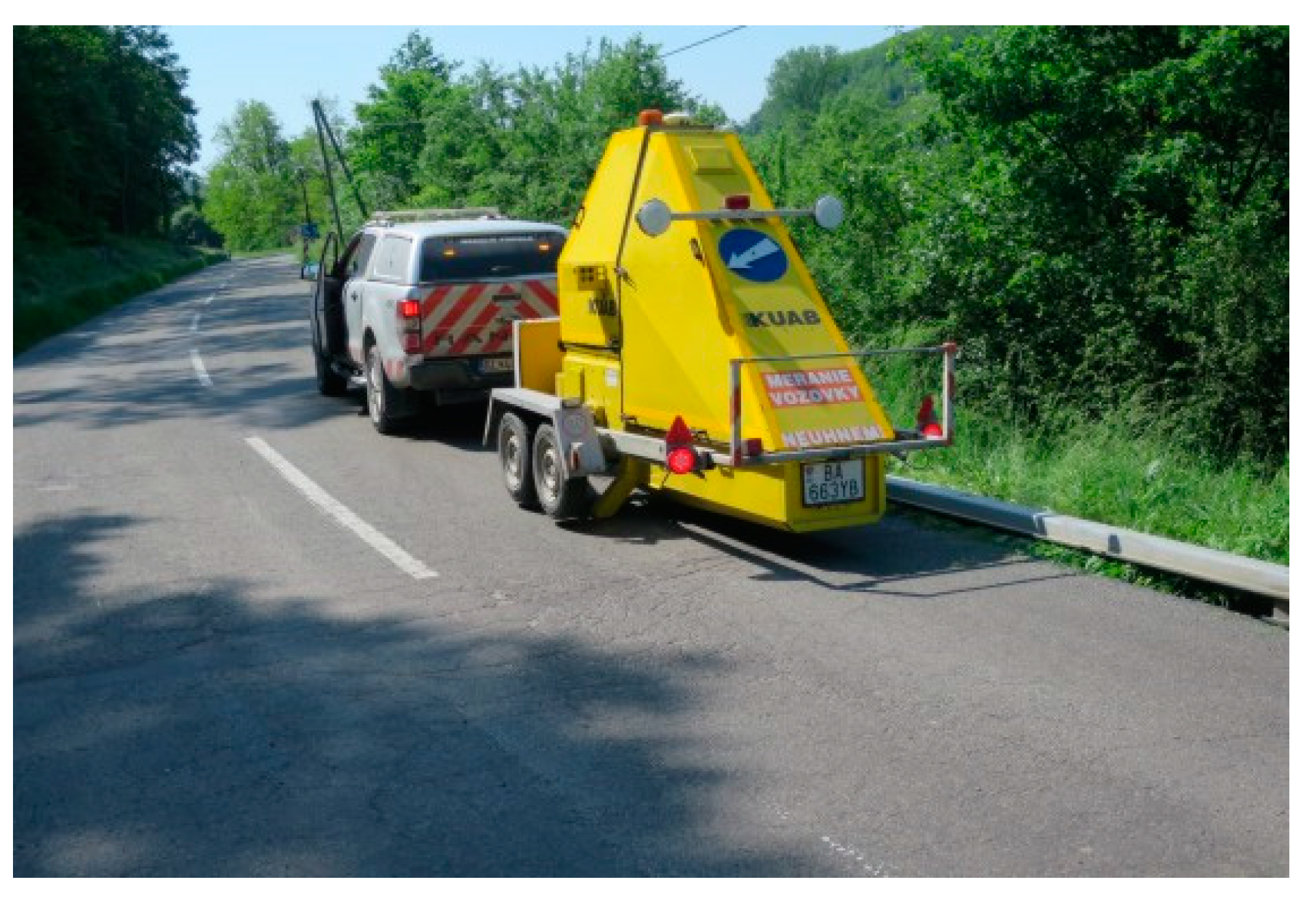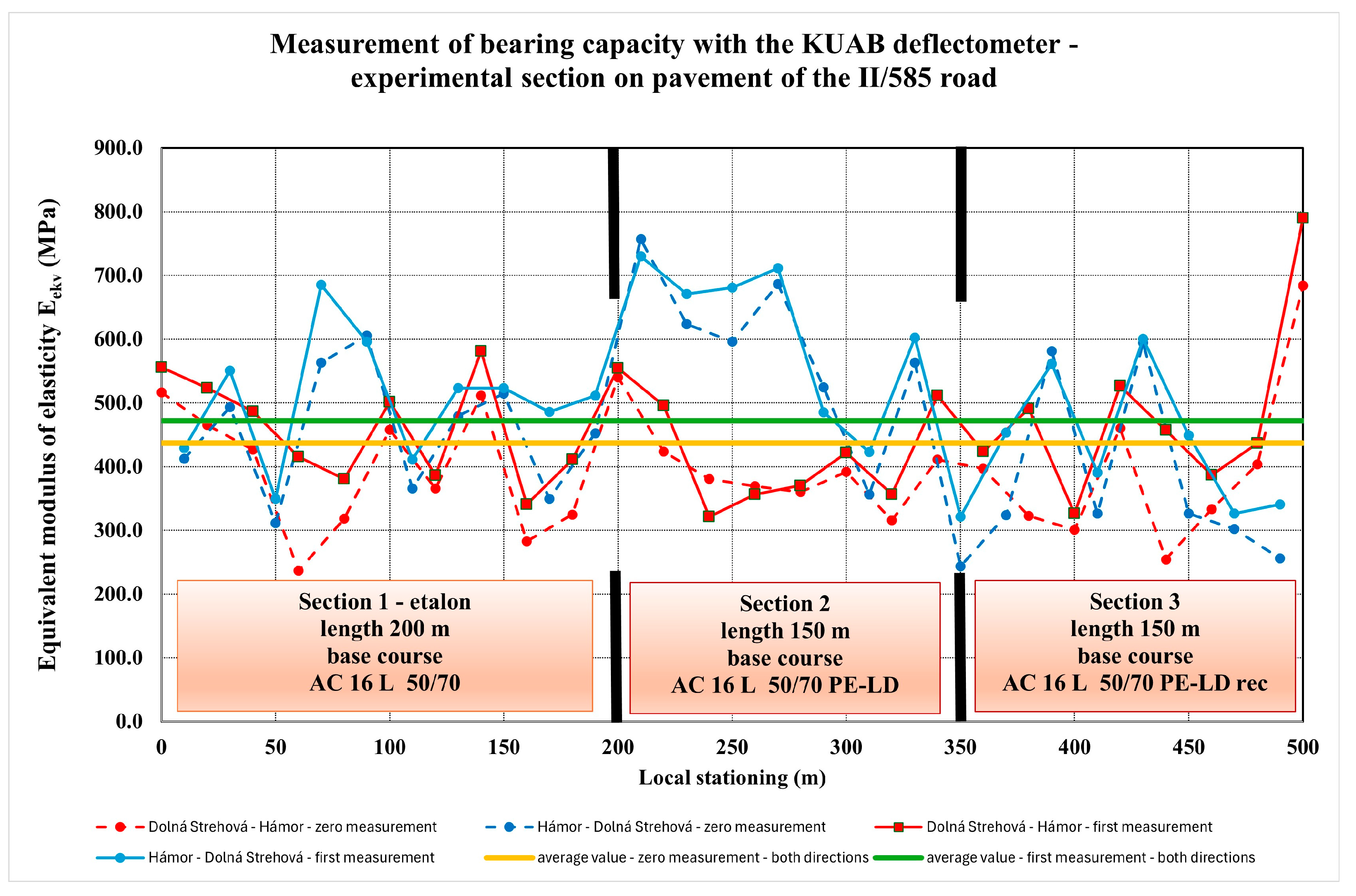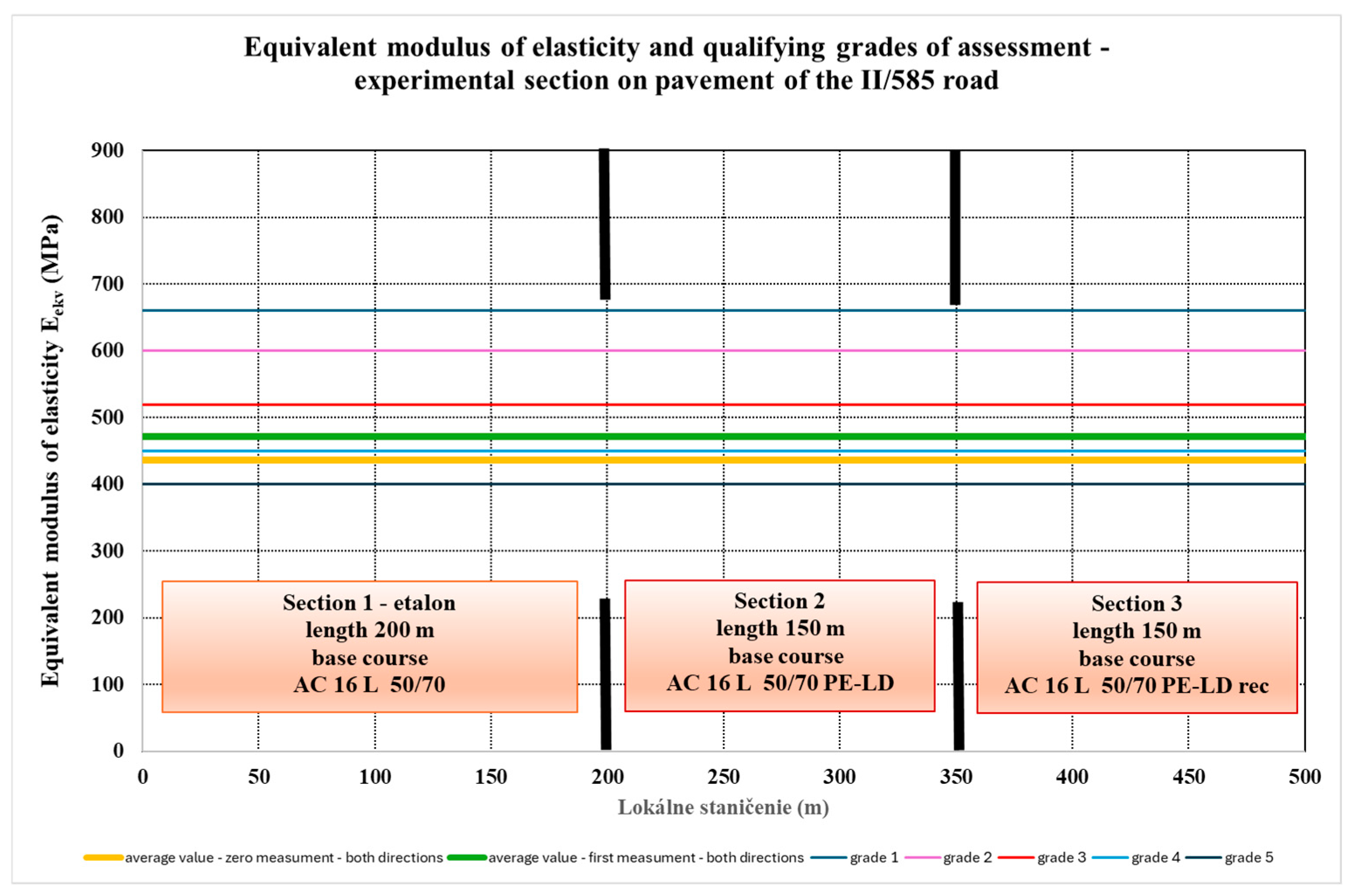Abstract
In this study, a critical evaluation and the benefits of using a waste and a virgin polymer in an asphalt mixture are presented. The present paper is the result of a three-year research effort to find a suitable recyclate compatible with asphalt binder and setting reaction conditions in the preparation of asphalt mixtures with the mentioned recyclate. This suitable candidate was recycled low-density polyethylene (LDPE), which was produced by recycling old, worn-out bags and films. An amount of 6% of LDPE by the weight of the binder content was suggested as the best amount of the modifier. Physical tests, including penetration, softening point, and kinematic viscosity have been carried out to prove the effectiveness of the modification on the binder properties. The effectiveness of the blending process and the appropriate concentration of additives led to a homogeneous polymer-modified bitumen without any imperfections in the structure. After successful preparation under laboratory conditions, this paper describes the preparation of asphalt mixtures directly in an asphalt-mixing plant and the subsequent implementation of a verification section. The overall composition of prepared polymer-modified asphalt mixtures has been studied. An important result of this study is the preparation of the asphalt mixture with waste LDPE that meets all the technical requirements. Moreover, it has been proven that this type of waste PE is fully applicable in asphalt-mixing plants in Slovakia, with zero or minimal financial burden on construction companies to complete the construction of their production facilities. Using such a technology, we can reduce the amount of waste plastics that otherwise end up in landfill.
1. Introduction
Packaging, in all its forms, is an integral part of our everyday lives. There is a very high probability that if we buy any product, it will be packed in bags, films, or boxes.
Plastic is the youngest of the packaging materials. It only appeared in the 19th century and was originally designed exclusively for military use. Real plastics as we know them today have been known since the 1920s [1]. The general use of plastics in packaging applications began after World War II. Polyethylene became a readily available material and quickly replaced wax paper. The growth of plastic packaging accelerated from the 1970s, when the plastic packaging industry started to grow. According to the statistics, the world’s plastic production has been growing exponentially over the past decade; while in 1950, 1.5 million tons of plastic was produced, in 2018, as much as 359 million tons of plastic was produced. In 2020, plastic production dropped sharply due to the coronavirus but has since resumed rapid growth [2]. Packaging accounts for up to 39.9% of the total amount of plastics produced.
Plastics are very cheap, durable, and also “viable” materials. However, when worn out, they become polluting waste. Around 26 million tons of plastic are produced in the EU every year, and only 30% of this is collected for recycling. Current recycling technologies, derived from processes used in oil processing and adapted to the processing of hydrocarbon waste into valuable semi-finished and finished products, are also characterized by the fact that they are very demanding from an investment point of view [3]. Significant investment capital and a sufficiently large waste market are required to build an economically viable processing unit. This is another reason for the current low recycling rate. Much of the collected plastic waste is exported by EU countries to third countries for further processing [2]. However, not all waste is disposed of in the ways described above. A large amount still goes to landfill, incinerators, or worst of all, ends up in forests, rivers, and seas. One possible solution to reduce plastic waste is to incorporate it into the asphalt mix [4,5,6,7,8].
Below some of the international experiences of using waste plastics in road construction are summarized:
- India has promoted the use of waste plastic in bituminous mixes for the construction of its national highways and rural roads and has approved it as a default mode of periodic renewal with hot mixes for roads within 50 km periphery of urban areas with a more than 500,000 population [9,10]. According to Vasudevan et al. (2012), a ton of waste plastic was used for every 1 km of road constructed, which reduced carbon dioxide emissions by 3 tons/km in comparison to standard construction techniques [11].
- In United Kingdom, MacRebur, a UK-based company, has developed a solution to use waste plastic within asphalt for road construction and surfacing [12,13]. MacRebur was also involved in the construction of plastic roads in the United States and Australia and is currently constructing South Africa’s first plastic road [14,15].
- Africa (Ghana, Ethiopia, etc.): A Ghana-based plastic recycling company, NelPlast Ghana Ltd., produces pavement blocks from waste plastic. Studies show that there is a reduction in road construction costs when using recycled plastic [16,17].
The general aspects that influence the incorporation of polymer into an asphalt mixture are outlined as follows:
Asphalt mixture is widely employed in road construction due to its durability and ability to withstand heavy traffic. All components and reaction conditions are affected by the resulting properties of the asphalt mixture. One of the most important components is bitumen.
According to the European specification (EN 12597), bitumen is a practically non-volatile, adhesive, and waterproof material obtained from petroleum or present in natural asphalt, which is completely or almost completely soluble in toluene, and it is very viscous or almost solid at ambient temperature [18]. From a chemical point of view, bitumen is a complex mixture of approximately 300 to 2000 chemical compounds. The most important are asphaltenes and maltens [19].
Asphaltenes are amorphous brown, resp. black solids that contain oxygen, sulfur, and transition metal atoms in the form of porphyrin rings of different length aliphatic chains, pyrrole, and pyridine rings. Due to the permanent electric charge and the presence of polar groups, together with polycyclic aromatic rings and metal complexes, asphaltenes contribute to the surface activity and adhesion of bitumen to aggregates.
Maltens, which are responsible for adhesive properties, flexibility, and stiffness, form the second important fraction of a bitumen structure. They contain lower-molecular-weight compounds, including resins, aromatic oils, and saturated paraffins, respectively [19].
Polymer characteristics and the principle of compatibility and construction methods are outlined as follows:
A plastic is any synthetic or semi-synthetic organic polymer, but to create a plastic, the polymer is always mixed with additives, including colorants, plasticizers, stabilizers, fillers, and reinforcements [20]. These additives affect the chemical composition and chemical and mechanical properties of a plastic, along with its price. Currently, the most used polymer waste products for modifying asphalt are polyethylene terephthalate (PET), polypropylene (PP), styrene–butadiene rubber (SBR), styrene–butadiene–styrene (SBS), polyethylene (PE), and ethylene–vinyl acetate (EVA) [21,22,23,24,25]. Polyethylene, including linear low-density polyethylene (LLDPE), low-density polyethylene (LDPE), and high-density polyethylene (HDPE), has been extensively researched and used in road applications due to its cost-effectiveness and performance enhancement [26,27]. From an economic and environmental standpoint, employing waste polymer as a modifier is advantageous, because it might assist in increasing the efficiency of pavements and the quality of roads, as well as finding a solution to the problem of waste disposal [28,29,30,31,32,33,34,35,36]. There are two common methods used to incorporate plastic into asphalt, namely, the wet method and the dry method [37]. In our study, we used the dry method for the preparation of the asphalt mixture with plastics. Plastics with a low melting point, such as PE and PP, are usually incorporated via the wet method. Moreover, their chemical structure allows them to melt when heated and solidify when cooled [38].
In this case, low-viscosity plastics should be preferred, because they provide better dispersion in the asphalt binder [20]. In this type, the solid polymer mixes with net bitumen at a high temperature before the modified binder is used in the asphalt mix. It should be pointed out that the mixing temperature and mixing time is very dependent on the type of polymer and bitumen. In the dry method, the polymer is mixed with the aggregates as a solid form similar to granules after which the net bitumen will be added.
It is very important to emphasize that the modification of the asphalt mixture using the polymer is not just the easy mixing of components. In order to obtain a suitable mixture, the parameters must meet certain criteria. First of all, the used bitumen must contain sufficient oily fractions to swell the polymer. It must also contain a high content of condensed components (aromatic hydrocarbons are often condensed and very miscible, especially with polar aromatic polymers) to guarantee the durability of the blends. Another point is the polymer, which must have an affinity for bitumen [39,40]. Ideal modification is achieved when the polymer is not soluble in bitumen. The crucial importance in the process of polymer blending into the asphalt mixture is the right selection of the type of plastics and their concentration. Previous studies have showed the potential benefits of using mainly polyethylene. It is due to the relatively low melting point. The explanation of the whole process is that the so called “phase separation” of the plastic must immediately occur when the plastic is added to the asphalt. Basically, it means that the soluble parts of the plastic are homogenously distributed into the asphalt and the other part microscopically swells. This needs to correspond with the rheological properties of the asphalt. The plastics are dispersed into the asphalt, while the viscosity reaches such values that creep of the material still occurs. This key parameter needs to be better understood in order for the resulting mix to obtain the expected improvements in many respects. The ideal modification is only achieved if the asphalt retains its internal structure, i.e., the molecules that determine only the macroscopic swelling of the polymer [41,42].
Such interactions are usually dependent on chemical affinity; that is, they are usually strongly influenced by chemical properties, especially by the polarity between interacting components [21].
To achieve the optimum mix, it is necessary to optimize the mixing conditions, i.e., to determine the asphalt/polymer ratio, the type of mixing apparatus, the mixing time, the temperature of the mixing process, and the possibility of using additives (e.g., adhesion additives, stabilizing additives, etc.). According to the abovementioned facts, the modification of the asphalt binder with plastics was performed and reported [43]. This is a key factor to know how the used plastics would affect the whole asphalt-mixture system. Additionally, in this case, the overall concentration can be determined and adjusted.
The main objective of this study is to make a significant scientific and technological contribution to the understanding of the fundamental physicochemical and technological processes involved in the effective incorporation of recycled plastics into asphalt mixtures. In our study, a commercially available and a waste low-density polyethylene were used. In this work, we have concentrated on achieving asphalt-mix properties with added recyclates that meet the criteria set for commonly used asphalt mixes. After successful preparation under laboratory conditions, we proceeded to prepare the asphalt mixtures directly in the asphalt-mixing plant and then to carry out the validation section.
The issue has been studied in Slovakia from various perspectives, but this work is unique in that the preparation of the asphalt mixture was set up in such a way that a conventional asphalt-mixture plant would be able to produce such a mixture without additional investment costs.
2. Materials and Methods
2.1. Materials and Methods
The binder used in this study was CA 50/70 bitumen procured from the manufacturer Mol, Nyrt. Hungary, and all the basic parameters of the sample were measured to make sure that the asphalt was of satisfactory quality for asphalt mixtures. The parameters measured were penetration (according to EN 1426) [44], softening point (according to EN 1427), and kinematic viscosity at 135 °C (according to EN 12 595) [45,46]. The scanning electron microscope (SEM, Tabletop Scanning Electron Microscope TM4000Plus, Hitachi High-Tech Corp., Matsue, Japan) was used to show the internal structure of the binder.
Aggregates of different fractions were used from the Horný Tisovník deposit. Prior to aggregate batching, the aggregates were washed, dried, and sieved into their respective size ranges. The aggregate gradation conformed to catalogue sheets of asphalt mixture specification for asphaltic concrete.
Two types as plastic additives were used:
- (a)
- Commercially available low-density polyethylene, a commercial product of Slovnaft, a. s. Bratislava. The general designation throughout the text is: PE-LD.
- (b)
- Waste polyolefin—so-called PE-LD recyclate—a product of RE-PLAST, s.r.o., Zvončín. It is a recyclate obtained from used films. The general designation throughout the text is: PE-LDrec.
The thermal and rheological properties of the samples used were measured. Thermal properties on the TGA 4000 Perkin Elmer equipment were measured. For the measurements of rheological curves, the Rheometer 5000 Ceast was used. In this case, at a constant temperature (190 °C), melted polymer is loaded with a piston with a step-varying rate, while the pressure arising from an individual load is recorded. The result is a rheological curve—shear stress and viscosity as a function of shear rate.
Fourier transform infrared spectroscopy (FTIR) was used to identify and characterize the chemical structure of PE-LDrec. This sample was also used in the laboratory experiments, but due to the fact that a new batch of sample was used for the practical experiments, the aforementioned sample parameters were measured to ensure the suitability of this batch. In practice, this means that the sample has identical or very similar physicochemical properties to the sample used in the laboratory experiments.
2.2. Preparation of Asphalt Mixture
2.2.1. Preparation of Asphalt Mixtures under Laboratory Conditions
In this study, a total of 3 asphalt mixes were prepared and characterized, namely:
- Asphalt mix AC 16 with 50/70 grade bitumen (designation in the text AC 16 L).
- Asphalt mix AC 16 with 50/70 grade bitumen and added 6 wt. % PE-LD (designation in text AC 16 L_PE-LD.
- Asphalt mix A 16 with 50/70 grade bitumen and added 6% by weight PE-LDrec (designation in text AC 16 L_PE-LDrec).
The whole procedure preparation of asphalt mixtures according to the EN 12697-35 was carried out [47]. The whole procedure with reaction conditions is described in detail in [48].
According to the basic physicochemical parameters, literature data, and our previous research studies, we started with the preparation of the components for mixing. The aggregate was dried at 110 ± 5 °C. The asphalt binder was also heated to 150 ± 20 °C. The ingredients were homogeneously mixed, e.g., until the aggregate was completely coated with the binder. The homogeneity of the mixture was checked visually. It is important to emphasize that mixing with commercially available polymer was set to 4 min. After this time, the ideal mixture was obtained. On the other hand, it should be noted that in case of PE-LDrec, the mixing time was increased up to 5–6 min. After this time, the homogenous asphalt mixture without any incompletely homogenized phases of PE-LDrec was obtained. After successful preparation, all required parameters according to the respective catalogue sheets were measured.
2.2.2. Preparation of Asphalt Mixtures in the Asphalt-Mixing Plant and Implementation of the Experimental Section
The production of asphalt mixtures was carried out in an asphalt-mixture plant of the Benninghofen type of the company VIAKORP, LTd. in Horný Tisovník. This plant is currently one of the most efficient plants available on the European market. It is designed according to the latest technical requirements and standards and in compliance with the applicable regulations. It also takes into account EU regulations, provisions, directives, and standards. In terms of size and cost reasonableness, it fulfils all relevant best available technique (BAT) requirements.
A part of the road in the cadaster of the municipality of Dolná Strehová was chosen as the validation section. The road surface was milled and prepared for the compound paving prior to the actual paving. The experimental section has a total length of 500 m. The asphalt layer was then compacted using a road roller. Samples were taken from each mix for laboratory determination of the empirical properties of the produced mixes.
2.3. Testing Methods
All prepared asphalt mixtures (e.g., asphalt mixtures prepared in the laboratory and in the asphalt-mixture plant) have been tested. The basic empirical properties of the produced mixes were carried out.
Pavement evaluation and diagnostics were also carried out at a time 5 months after the laying of the new overlay of the pavement. The measurement was carried out by an employee of the Slovak Road Administration. The bearing capacity of the asphalt pavement was measured with the FWD KUAB-type deflectometer. The deflectometer (FWD KUAB) is a pavement impact load test device, generating a load by dropping a load on damping pads, placed on the surface of a circular load plate, which is in contact with the pavement surface.
The purpose of measuring and evaluating the bearing capacity of the asphalt pavement using the F WD KUAB equipment was to compare the bearing capacity of the original pavement (zero measurement) and the bearing capacity after the application of the three types of asphalt mixtures (first measurement).
The number of trucks on the road in question is less than 500 per 24 h (data provided by the Slovak Road Administration).
3. Results
3.1. Basic Characteristics of the Starting Materials
3.1.1. Basic Characteristic of Used Bitumen
The measured values of the basic parameters, as penetration test, softening point and kinematic viscosity of the bitumen with a penetration grade of 50/70 meets all the requirements for asphalt of this type, according to the asphalt catalogue sheets.
The internal structure, as is shown on the microscopy scheme, is homogenous without any other impurities. (Figure 1). Elemental chemical analysis based on the microscopic measurements showed that the used binder contains mainly carbon (appr. 97%). Negligible amounts of silicon and sulfur were also detected, but they did not affect the basic properties of the asphalt binder.

Figure 1.
SEM microscopic analysis of CA 50/70 bitumen.
3.1.2. Basic Characteristics of the Plastic Additives
Thermal and rheological tests were performed on samples of the additives, i.e., PE-LD and PE-LDrec. It should be pointed out that PE-LDrec is a waste plastic prepared by recycling. The input material, which is a waste PE foil, is sorted, washed, and then processed on the EREMA recycling line. The regranulate is mixed in a homogenization silo as a standard batch (24 t). Figure 2 shows the used additives.
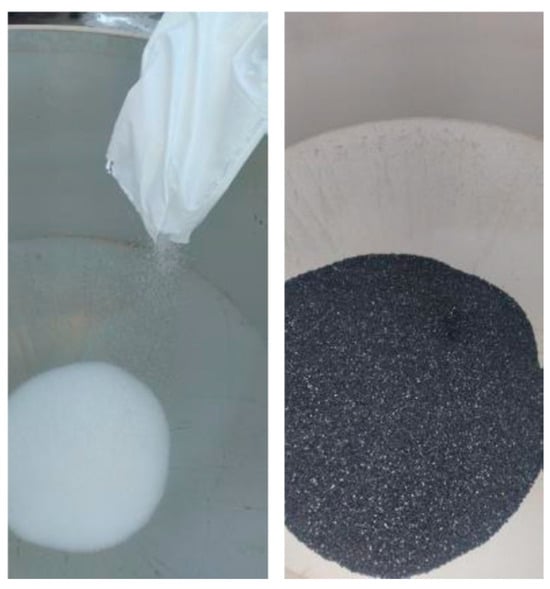
Figure 2.
Granules ready for mixing with asphalt and aggregate (white granulate is PE-LD, black is PE-LDrec).
As a blank sample, the natural (commercially available) PE-LD was used. The basic thermal parameters for the used commercially available polyethylene (PE-LD) and waste additive, e.g., PE-LDrec with the appropriate test method, are summarized in Table 1. Figure 3 shows the FTIR spectra of the recyclate. Figure 4 shows the rheological curves of the samples PE-LD and PE-LDrec.

Table 1.
Basic rheological and thermal parameters of commercially available polyethylene (PE-LD) and PE recyclate (PE-LDrec).

Figure 3.
FTIR spectrum of PE-LDrec and results from comparison with spectral library.
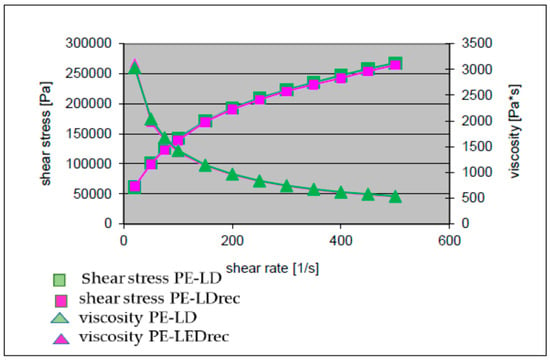
Figure 4.
Rheological curves at 190 °C of samples PE-LD and PE-LDrec.
Thermal analysis confirmed the assumption that the recyclate sample contains two types of polyethylene (most likely a 2:1 blend of PE-LD and liner PE-LD, given the melting temperatures). Two measurements were made on a capillary rheometer, as the melt flow index measurement confirmed a non-uniform flow, indicating uneven mixing of the different components in the recyclate. For the FTIR measurement, plates were pressed, and two samples were measured due to the abovementioned effect.
The FTIR spectra (Figure 3) clearly confirmed that, despite all the differences in the flux properties of the different parts of the sampled recyclate, the differences in the flux properties of the different parts of the sampled recyclate are comparable. However, the composition of the recyclate does not negatively affect its use as an asphalt-mix modifier. The measured rheological curves (Figure 4) of the two used additives were almost identical. Several measurements were made on the capillary rheometer, because we were initially inclined to emphasize that the material flow did not appear different in the case of waste polyethylene. However, this assumption was not confirmed.
3.2. Design of the Basic Composition of Asphalt Mixtures for Asphalt Overlays and Processing of Mix Recipes in Accordance with the Requirements
In the next part of our study, we proceeded to design the basic composition of asphalt mixtures for the base course. The composition is described in Table 2.

Table 2.
Composition of asphalt mixtures “AC 16”.
In the case of using PE-LDrec, the 6% PE-LDrec was used per weight of asphalt mixture.
In this case, our findings from previous work were used. The grading curves meet the requirements for aggregate gradation and quality, according to the applicable technical notes.
3.3. Design of the Basic Composition of Asphalt Mixtures for Asphalt Overlays and Laboratory Preparation of Asphalt Mixtures and Evaluation of Measured Results
The requirements of the departmental regulations KLAZ and TKP 6 were respected in the design of the basic composition of asphalt mixtures for the asphalt base course. The laboratory verification of our three mixes was a key task of our study. As this was the first time that research of this type and scale had been carried out in Slovakia, we needed to have it verified that our mixes could be prepared under laboratory conditions and that the empirical parameter test results were in accordance with the requirements of the relevant datasheets. The actual asphalt-mix design and laboratory preparation together with the measured parameters are listed in Table 3.

Table 3.
Composition of the parameters of asphalt mixture (prepared in the laboratory) without added PE-LDrec and asphalt mixture with added PE-LDrec.
It should be pointed out that there are negligible deviations in the monitored parameters between the asphalt mixture prepared using recyclate and without recyclate.
Small deviations were measured in the case of intergranularity, resistance to permanent deformations, and water sensitivity. These small deviations can be eliminated by changing the reaction conditions. On the other hand, it is very important to point out that this recycled plastic is being used for the first time in such a system. In this case, it is necessary to look at the physicochemical and technical parameters of the recyclates on a broad scale. In our study, a small change does not have such a big impact on the resulting asphalt mix’s properties. However, it may be the case that larger deviations on the properties of commercial plastic could affect the final properties to a much greater extent. These findings will need to be taken into account in the preparation of the materials.
In addition to the basic physicochemical and technical parameters of the starting materials, it is very important to understand the so-called adhesion of the asphalt binder to the aggregate. This condition in our research is even more important than ever, since this is the first time the recyclate has been used in Slovakia on such a scale.
To establish this fact, the so-called adhesion test was used according to EN 12697-11 [49]. The adhesion test was carried out with three different types of asphalt binder: the net binder, the asphalt binder modified by commercially available PE-LD, and the asphalt binder modified by recyclate, PE-LDrec. The adhesion of bitumen to the aggregate was evaluated visually by specifying the percentage of unwashed surface of the aggregate sample. The adhesion of the asphalt binder to the aggregate for all tested samples was the same and amounted to 85–90%.
These results are extremely valuable for preparation in the asphalt-mixing plant. If the aggregate had not been completely coated with the binder, it could not have been considered for the test section.
3.4. Preparation of Asphalt Mixtures in the Asphalt-Mixing Plant and Implementation of the Verification Section
After the successful preparation of the asphalt mixtures under laboratory conditions, we proceeded to prepare identical mixtures in the asphalt-mixing plant. The mix designs and compositions used in the production process were the same as those prepared in the laboratory. The preparation was carried out continuously without any problems. Three types of asphalt mixes were prepared in succession, according to the calculation for approximately 500 m of the verification section (approx. 20–24 tons/100 m). Figure 5 illustrates a photograph of a tanker with the asphalt binder added to the aggregate in a quantity dependent on the composition design. Figure 6 shows the asphalt-mixture plant and the real process.

Figure 5.
Tankers with asphalt binder located in asphalt-mix plant.
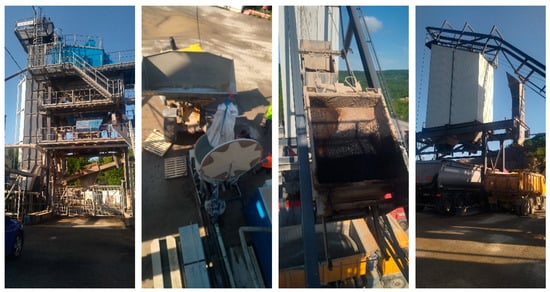
Figure 6.
Photo documentation of the asphalt-mix preparation process in the asphalt-mixture plant.
3.5. Implementation of the Experimental Section
The road in the cadaster of the village Dolná Strehová was selected as the experimental section. The road was milled and prepared for laying (cleaned and treated with a joint spray) before the actual laying. The produced asphalt mixtures (three types) were transported to the site and then laid in a section of approximately 500 m in length. The preparation of the verification section and the actual implementation were carried out without complications. The asphalt mix with added recyclate behaved very similarly to the virgin asphalt mix during laying. The subsequent compaction of the laid layer was also trouble-free. Figure 7 shows photo documentation of the implementation of the experimental section.
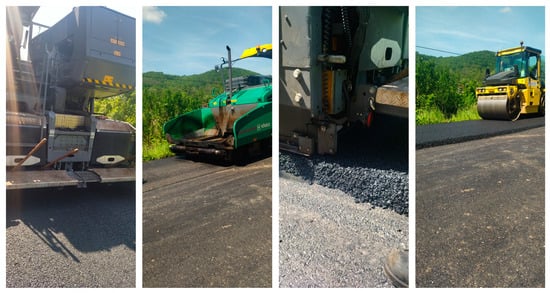
Figure 7.
Photo documentation of the asphalt-mix laying process on the verification section.
Samples were taken from each mixture to determine the properties, according to the relevant catalogue sheets in the laboratory. The resulting values for all mixtures are given in Table 4.

Table 4.
Composition of the parameters of asphalt mixture (prepared in the asphalt mixture plant.) without added PE-LDrec and asphalt mixture with added PE-LDrec.
According to our findings from laboratory measurements and the parameters, the procedure was slightly modified in the case of used recyclate. The mixing time was increased to 7–10 min. This time is needed in a plant to obtain the homogenous mixture. To evaluate the measured results, it should be pointed out that very slight changes in the measured parameters were found. Intergranularity is slightly higher in the case of PE-LDrec than in other cases. The results show that all asphalt mixtures had similar indirect tensile strength ratio (ITSR) values between 77% and 79%. Small changes in the case of resistance to permanent deformations were observed.
The measured results declare that the use of this particular type of recyclate does not deteriorate the properties of the asphalt mixture type AC 16 L. The actual implementation of the test section was carried out without complications. Our results are in accordance with the applicable regulations and do not show any significant deviations from the requirements for asphalt mixtures.
3.6. Pavement Assessment and Diagnostics
The experimental section has a total length of 500 m. It was divided into three sections:
- -
- Section 1 (etalon)—section length 200 m—AC 16 L 50/70; 70 mm thick cover layer
- -
- Section 2—section length 150 m—AC 16 L 50/70 PE-LD; 70 mm thick cover layer
- -
- Section 3—section length 150 m—AC 16 L 50/70 PE-LDrec.; 70 mm thick cover layer.
Asphalt concrete AC 11 O 50/70 with a thickness of 50 mm was used as the wearing course. The verification section is located between the village Dolná Strehová (the beginning of the section) and the village Hámor (the end of the section) on the road II/585. The location of the carriageway is shown schematically in Figure 8. Sections 1 (etalon), 2, and 3 are also shown. In this paper, only relative/local stationing will be considered.
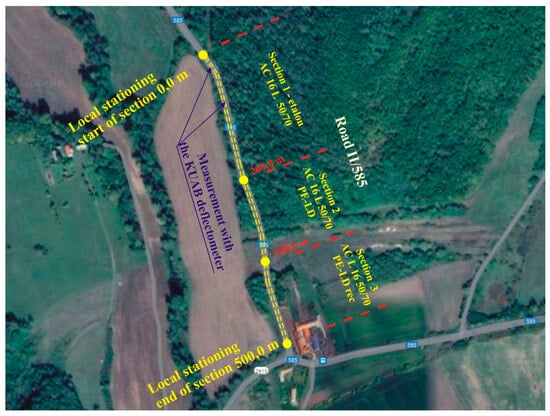
Figure 8.
The verification section—scheme.
We divided the evaluation of the measured data into:
- -
- conversion to a uniform load of 50 kN.
- -
- conversion to a uniform temperature of 20 °C.
The evaluation of measurements was carried out in accordance with the regulation TP 031.
The zero measurement on the original road was carried out on 23 April 2023 in both lanes (see Figure 8) with a measurement step of 20 m. The first measurement was carried out on 27 September 2023 at a time 5 months after the laying of the new base course and wearing course of the asphalt pavement.
The measurement of the bearing capacity of semi-rigid and flexible asphalt pavements and the subsequent evaluation of the homogeneity of the section are among the basic characteristics that are assessed in terms of pavement life evaluation (pavement efficiency).
In Slovakia, this activity/measurement is carried out by the Slovak Road Administration staff using a measuring device deflectometer type KUAB 2 m–50. This device carries out bearing capacity measurements on the road network of the Slovak Republic all year round, except when the measurement conditions are not fulfilled (winter period and extremely warm period).
Figure 9 shows the measurement with the KUAB deflectometer.
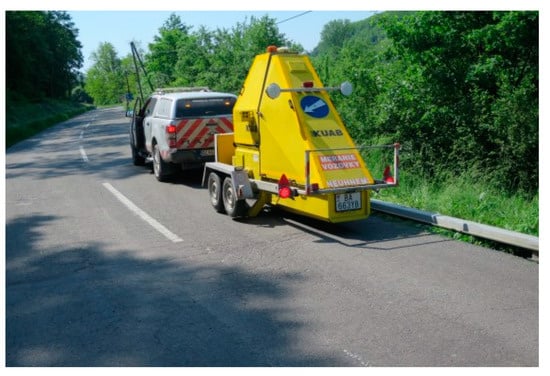
Figure 9.
Measurement of bearing capacity with the KUAB deflectometer.
The measured values of the equivalent modulus of elasticity of the pavement corrected for load and temperature are shown in Figure 10 for both lanes.
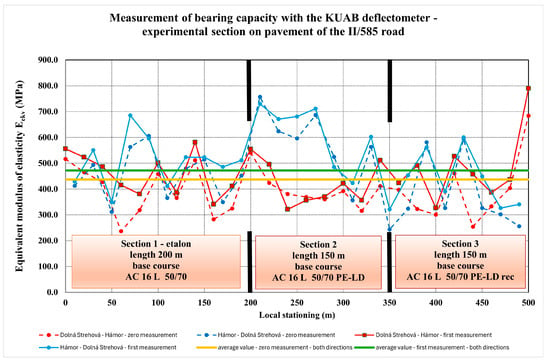
Figure 10.
Equivalent modulus of elasticity for both lanes.
The classification grades according to Regulation TP 031 for flexible pavements and traffic load (traffic load class IV to VI for TNV < 500) are given in Table A.3 of TP 031 [50].
Figure 11 shows the measured values of the equivalent modulus of elasticity of the pavement. The values are supplemented by the classification grades for the given pavement type and the given traffic load.
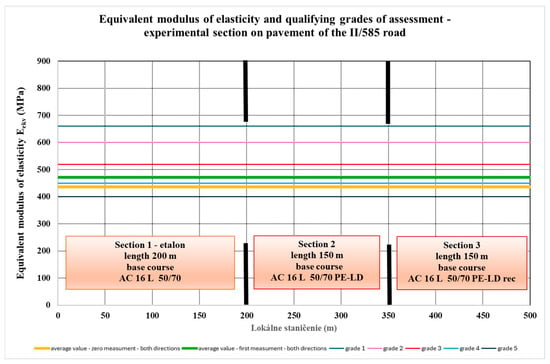
Figure 11.
Equivalent modulus of elasticity and individual qualification grades.
The main advantage of this measurement is that we are able to obtain a sufficient number of measurement points using a non-destructive method for evaluation and to compare the obtained results between different pavement constructions/individual sections (relative comparison) and also an absolute evaluation, the criteria of which are specified in the technical regulation of the Slovak Road Administration TP 031. Deflectometer measurements were used to compare three tested sections/three pavement structures where different types of plastic were used in the base layer.
A statistical evaluation of the equivalent modulus of elasticity of the zero measurement for both lanes shows that the values of the elastic moduli are very unevenly distributed (coefficient of variation Vc = 31.1). For the zero measurement, the homogeneity of the whole section improved (coefficient of variation Vc = 25.7). The homogeneity improvement occurred using standard asphalt mixtures without recyclates (Section 1) and also asphalt mixtures with recyclates (Sections 2 and 3). When evaluating the bearing capacity of a pavement using the average modulus of elasticity, the measured values of the bearing capacity for a given load are the corresponding values for a given traffic load. The pavement exhibits the behavioral characteristics of a flexible pavement. In the case of the zero measurement, the value of the average modulus of elasticity for the whole section can be classified as grade IV—sufficient bearing capacity in accordance with TP 031. In the first measurement, the classification grade improved to grade III—good bearing capacity (see Figure 10). This was also due to the replacement of the fatigued original asphalt mixes with new asphalt mixes with and without the use of recyclates. When the three sections are evaluated separately, there is a clear increase in the elastic modulus for the first measurement in all sections. We obtained a comparison of the three sections used in terms of absolute comparison and also relative comparison of each section. In the case of the application of the investigated waste plastic in asphalt mixtures on pavements belonging to the road network under the administration of the Slovak Road Administration, these results will be decisive for the approval of this material/additive in the asphalt mixture in terms of pavement life/pavement efficiency.
A comparison of the average modulus of elasticity for the individual sections from the first measurement after application of the three types of base layer shows similar values (for Section 1, Eekv = 481 MPa; for Section 2, Eekv = 483 MPa; for Section 3, Eekv = 450 MPa).
Based on the results of the bearing capacity measurements on the experimental section, it can be concluded that the characteristics of the tested pavement (equivalent modulus of elasticity and homogeneity) with the use of waste plastic in the asphalt mixture (the base layer) show similar characteristics to those of the standard asphalt mixture. We consider the results evaluated so far to be informative, and we will continue to measure the bearing capacity of the experimental section with the KUAB deflectometer with a periodicity of 1 year.
4. Conclusions
The research results clearly state the significant scientific and technological contribution to the understanding of the fundamental physicochemical processes involved in the effective incorporation of recycled plastics into asphalt mixtures. Our main results should be concluded as follows:
- -
- The LDPE is fully compatible with the asphalt mixture, e.g., with the aggregate and asphalt binder type CA50/70.
- -
- The optimum value of commercially available and plastic waste added to the asphalt mixture from the experimental results is 6% by weight.
- -
- The main chemical mechanism and reaction conditions were fully verified at laboratory conditions.
- -
- The technological process was set and fully described. In addition, the described and verified technological process is fully applicable to asphalt-mix plants in Slovakia, with zero or minimal financial burden on construction companies to complete their plants. Using waste plastic in the construction of flexible pavements—as was completely verified in the real section—we can reduce the impact on the environment.
- -
- In conclusion, it should be added that such an extremely broad and successful scientific and technological project with a high interdisciplinary character has been implemented for the first time in Slovakia. The companies behind the scientific and technological success of the project can rightly be described as environmentally advanced companies.
- -
- The results show that some basic principles of the circular economy are fulfilled in this study. In this study, waste packaging materials, which in many cases would have ended up in landfill sites, were used. The Slovak Republic is trying to increase the recycling rate of several waste streams and divert waste from landfill. Using 6 wt. % of waste PE as tested in this study is perhaps not enough to say that we have diverted a lot of waste from landfill. However, any new technology that is not linear contributes to the global improvement of the situation. This study is the beginning of a technology that can be further refined, e.g., by using recycled aggregates, etc. However, our initial results show that only in the case of using low-density PE and 6 wt.%, we can produce a mixture with the relevant technical requirements.
Author Contributions
Conceptualization, R.K. and J.M.; methodology, A.C. and R.K.; software, A.F.; validation, A.F. and A.C.; formal analysis, J.M.; investigation, A.C.; resources, R.K.; data curation, A.F.; writing—original draft preparation, A.C.; writing—review and editing, R.K., J.M., and A.F.; visualization, R.K.; supervision, J.M.; project administration, A.C. and A.F.; funding acquisition, R.K. All authors have read and agreed to the published version of the manuscript.
Funding
This work was supported by the Research and Development Agency under Contract No. APVV-19-0520.
Data Availability Statement
The data presented in this study are available upon request from the corresponding author.
Acknowledgments
The authors would like to thank their technology partners for their professional and technical assistance in the implementation of the project tasks, namely RE-PLAST, s.r.o. Zvončín for the supply of recyclates and VIAKORP, s.r.o. for the implementation of the experimental section. The authors would like to thank the co-investigating organization VÚRUP, LTd. Bratislava for their professional and technical assistance in solving the tasks of the project.
Conflicts of Interest
Authors Adriana Czímerová and Adrián Fonód were employed by the company VUIS-CESTY, Ltd. The remaining authors declare that the research was conducted in the absence of any commercial or financial relationships that could be construed as a potential conflict of interest.
References
- Liptáková, T.; Alexy, P.; Gondár, E.; Kuhnová, V. Polymérne Konštrukčné Materiály; EDIS: Žilina, Slovakia, 2012; ISBN 9788055405056. [Google Scholar]
- Available online: https://www.europarl.europa.eu/news/sk/headlines/society/20180830STO11347/ako-sa-eu-snazi-zredukovat-plastovy-odpad (accessed on 19 May 2023).
- Kalali, E.N.; Lotfian, S.; Shabestari, M.E.; Khazatyadeh, S.; Zhao, C.; Nezhad, H.Y. A critical review of the current progress 613 of plastic waste recycling technology in structural materials. Curr. Opin. Green Sustain. Chem. 2023, 40, 100763. [Google Scholar] [CrossRef]
- Ogundana, A.K. Waste plastic in road construction, pathway to a sustainable circular economy: A review. In Proceedings of the 4th International Conference on Design and Manufacturing Aspects for Sustainable Energy (ICMED-ICMPC 2023), Hyderabad, India, 19–20 May 2023; Volume s391, p. 01116. [Google Scholar] [CrossRef]
- Abdy, C.; Zhang, Y.; Wang, J.; Yang, Y.; Artamendi, I.; Allen, B. Pyrolysis of polyolefin plastic waste and potential applications in asphalt road construction: A technical review. Resour. Conserv. Recycl. 2022, 180, 106213. [Google Scholar] [CrossRef]
- Jawaid, M.; Singh, B.; Kian, L.K.; Zaki, S.A.; Radzi, A.M. Processing Techniques on Plastic Waste Materials for Construction and Building Applications. Curr. Opin. Green Sustain. Chem. 2023, 40, 100761. [Google Scholar] [CrossRef]
- Nyika, J.; Dinka, M. Recycling plastic waste materials for building and construction Materials: A minireview. Mater. Today Proc. 2022, 62, 3257–3262. [Google Scholar] [CrossRef]
- Yao, L.; Leng, Z.; Lan, J.; Chen, R.; Jiang, J. Environmental and economic assessment of collective recycling waste plastic and reclaimed asphalt pavement into pavement construction: A case study in Hong Kong. J. Clean. Prod. 2022, 336, 130405. [Google Scholar] [CrossRef]
- Government of India. Use of Plastic Waste in Bituminous Mixes in Construction of National Highways; Ministry of Road Transport & Highway: New Delhi, India, 2015.
- Indian Road Congress. Guidelines for the Use of Waste Plastic in Hot Bituminous Mixes (Dry Process). In Wearing Courses; The Indian Road Congress: New Delhi, India, 2013. [Google Scholar]
- Vasudevan, R.; Ramalinga Chandra Sekar, A.; Sundarakannan, B.; Velkennedy, R. A technique to dispose waste plastics in an ecofriendly way—Application in construction of flexible pavements. Constr. Build. Mater. 2012, 28, 311–320. [Google Scholar] [CrossRef]
- White, G.; Reid, G. Recycled Waste Plastic for Extending and Modifying Asphalt Binders. 2017. Available online: https://www.researchgate.net/publication/324908837_RECYCLED_WASTE_PLASTIC_FOR_EXTENDING_AND_MODIFYING_ASPHALT_BINDERS (accessed on 1 May 2018).
- White, G. Evaluating recycled waste plastic modification and extension of bituminous binder for asphalt. In Proceedings of the Eighteenth Annual International Conference on Pavement Engineering, Asphalt Technology and Infrastructure, Liverpool, UK, 27–28 February 2019. [Google Scholar]
- Sasidharan, M.; Torbaghan, M.E.; Burrow, M. Using waste plastics in road construction. In Helpdesk Report; University of Birmingham: Birmingham, UK, 2019; pp. 1–18. [Google Scholar]
- Kumar, P.P. Use of waste plastics in road construction. Int. J. Technol. Res. Eng. 2015, 5, 2347–4718. [Google Scholar]
- Welegabir, A.; Fisshaye, B.; Korkos, G.; Debissa, K.; Demmissie, M.; Kalayu, A. Partially Replacement of Waste Plastics in Bituminous Mixes as Road Construction Material. Bachelor’s Thesis, Ethiopian Institute of Technology, Mekelle, Ethiopia, 2014. [Google Scholar]
- Genet, M.B.; Sendekie, Z.B.; Jembere, A.L. Investigation and optimization of waste LDPE plastic as a modifier of asphalt mix for highway asphalt: Case of Ethiopian roads. Case Stud. Chem. Environ. Eng. 2021, 4, 100150. [Google Scholar] [CrossRef]
- EN 12597; Bitumen and Bituminous Binders-Terminology. European Committee for Standardization: Brussels, Belgium, 2000.
- D’Melo, A.; Taylor, R. Constitution and structure of bitumens. In The Shell Bitumen Handbook, 6th ed.; Hunter, R.N., Self, S., Read, J., Eds.; ICE Publishing: London, UK, 2015; ISBN 978-0727758378. [Google Scholar]
- Larson, E.R. Thermoplastic Material Selection; Elsevier Inc.: New York, NY, USA, 2015; ISBN 978-0-323-31299-8. [Google Scholar]
- Zhu, J.; Birgisson, B.; Kringos, N. Polymer Modification of Bitumen: Advances and Challenges. Eur. Polym. J. 2014, 54, 18–38. [Google Scholar] [CrossRef]
- Duarte, G.M.; Faxina, A.L. High-Temperature Rheological Properties of Asphalt Binders Modified with Recycled Low-Density Polyethylene and Crumb Rubber. Constr. Build. Mater. 2021, 298, 123852. [Google Scholar] [CrossRef]
- Du, Z.; Jiang, C.; Yuan, J.; Xiao, F.; Wang, J. Low Temperature Performance Characteristics of Polyethylene Modified Asphalts—A Review. Constr. Build. Mater. 2020, 264, 120704. [Google Scholar] [CrossRef]
- Leng, Z.; Padhan, R.K.; Sreeram, A. Production of a Sustainable Paving Material through Chemical Recycling of Waste PET into Crumb Rubber Modified Asphalt. J. Clean. Prod. 2018, 180, 682–688. [Google Scholar] [CrossRef]
- Mustafa, S.; Hameed, M.A.; Dulaimi, A. Evaluation of the Properties of Modified Local Asphalt Binder by Using Styrene Butadiene Rubber (SBR) or Low-Density Polyethylene (LDPE). Sci. Rev. Eng. Environ. Sci. 2022, 31, 190–202. [Google Scholar] [CrossRef]
- Abduljabbar, N.; Al-Busaltan, S.; Dulaimi, A.; Al-Yasari, R.; Sadique, M.; Nageim, H. Al the Effect of Waste Low-Density Polyethylene on the Mechanical Properties of Thin Asphalt Overlay. Constr. Build. Mater. 2022, 315, 125722. [Google Scholar] [CrossRef]
- Kalantar, Z.N.; Karim, M.R.; Mahrez, A. A Review of Using Waste and Virgin Polymer in Pavement. Constr. Build. Mater. 2012, 33, 55–62. [Google Scholar] [CrossRef]
- Xiao, R.; Polaczyk, P.; Huang, B. Mitigating Stripping in Asphalt Mixtures: Pretreatment of Aggregate by Thermoplastic Polyethylene Powder Coating. Transp. Res. Rec. J. Transp. Res. Board 2023, 2678, 776–787. [Google Scholar] [CrossRef]
- Elnaml, I.; Liu, J.; Mohammad, L.; Dylla, H.; Wasiuddin, N.; Cooper, S., III; Copper, S., Jr. Recycling waste plastics in asphalt mixture: Engineering performance and environmental assessment. J. Clean. Prod. 2024, 453, 142180. [Google Scholar] [CrossRef]
- Anwar, M.K.; Shah, S.A.R.; Alhazmi, H. Recycling and Utilization of Polymers for Road Construction Projects: An Application of the Circular Economy Concept. Polymers 2021, 13, 1330. [Google Scholar] [CrossRef] [PubMed]
- Giri, J.P.; Panda, M.; Sahoo, U.C. Use of waste Plastic for modification of bituminous paving mixes containing recycled concrete aggregates. Road Mater. Pavement Des. 2020, 21, 289–309. [Google Scholar] [CrossRef]
- Al-Hadidy, A.I.; Yi-qiu, T. Effect of Plastic on life of flexible pavements. Constr. Build. Mater. 2009, 23, 1456–1464. [Google Scholar] [CrossRef]
- Mashaan, N.S.; Rezagholilou, A.; Nikraz, H. Waste Plastic as Additive in Asphalt Pavement Reinforcement: A review. In Proceedings of the 18th AAPA International Flexible Pavements Conference, Sydney, Australia, 1–9 August 2019; Available online: https://www.researchgate.net/profile/NuhaMashaan/publication/335541754_Waste_Plastic_as_Additive_in_Asphalt_Pavement_Reinforcement_A_review/links/5e8b0a35a6fdcca789f83bfe/Waste-Plastic-as-Additive-in-Asphalt-Pavement-Reinforcement-A-review.pdf (accessed on 1 August 2019).
- Gadekar, G.; Prasad, A.; Mandalkar, V.; Sarnaik, S.; Marawar, S.; Vispute, G. Upcycling plastic waste for road construction. Int. J. Res. Trends Innov. 2023, 8, 2279–2283. [Google Scholar]
- Santos, J.; Phamb, A.; Stasinopoulos, P.; Giustozzi, F. Recycling waste plastics in roads: A life-cycle assesment study using primary data. Sci. Total Environ. 2021, 51, 141842. [Google Scholar] [CrossRef] [PubMed]
- Zhao, Z.; Xiao, F.; Amirkhanian, S. Recent applications of waste solid materials in pavement engineering. Waste Manag. 2020, 108, 78–105. [Google Scholar] [CrossRef]
- Jwaida, Z.; Dulaimi, A.; Mydin, A.O.; Özkılıç, Y.O.; Jaya, R.P.; Ameen, A. The use of waste polymers in asphalt mixtures: Bibliometric analysis and systematic review. J. Compos. Sci. 2023, 7, 415. [Google Scholar] [CrossRef]
- Bueno, I.M.; Teixeira, J.E.S.L. Waste plastic in asphalt mixtures via the dry method: A bibliometric analysis. Sustainability 2024, 16, 4675. [Google Scholar] [CrossRef]
- Bouldin, M.G.; Collins, M.J.H.; Berker, A. Rheology and microstructure of polymer/asphlat blends. Rubber Chem. Technol. 1990, 64, 577–600. [Google Scholar] [CrossRef]
- Beker, Y.; Mendez, P.M.; Rodriguez, Y. Polymer modified asphalt. Vis. Tecnol. 2001, 9, 39–48. [Google Scholar]
- Giavarini, C. Polymer-Modified Bitumen. In Apshaltenes and Asphalts 1. Developments in Petroleum Science; Yen, T.F., Chilingarianeds, G.V., Eds.; Elsevier: New York, NY, USA, 1994; pp. 381–400. [Google Scholar]
- Nisar, J.; Shafi Mir, M.; Vivek. Exploring the potential of waste plastic-modified asphalt: A systematic review of blending 700 ratios, mixing conditions, and rheological properties. Environ. Sci. Pollut. Res. Int. 2024, 31, 11507–11528. [Google Scholar] [CrossRef] [PubMed]
- Czímerová, A.; Takáčová, A.; Sasai, R.; Lukáčová, E. Bitumen modified by virgin and waste low-density polyethylene. Pet. Coal 2023, 65, 363–375. [Google Scholar]
- EN 1426:2015; Bitumen and Bituminous Binders-Determination of Needle Penetration. European Committee for Standardization: Brussels, Belgium, 2015.
- EN 1427:2015; Bitumen and Bituminous Binders-Determination of the Softening Point—Ring and Ball Method. European Committee for Standardization: Brussels, Belgium, 2015.
- EN 12595:2023; Bitumen and Bituminous Binders-Determination of Kinematic Viscosity. European Committee for Standardization: Brussels, Belgium, 2023.
- EN 12697-35:2016; Bituminous Mixtures—Test Method—Part 35: Laboratory Mixing. European Committee for Standardization: Brussels, Belgium, 2016.
- Kovács, R.; Lukáčová, E.; Csölle, M.; Mandula, J. Use of recycled polyethylene in asphalt mixture. Selected Scientific Papers. J. Civ. Eng. 2023, 18, 1–13. [Google Scholar] [CrossRef]
- EN 12697-11:2016; Bituminous Mixtures—Test Method—Part 11: Determination of the Affinity between Aggregate and Bitumen. European Committee for Standardization: Brussels, Belgium, 2016.
- TP031; Measurement and Evaluation of Asphalt Road Capacity by FWD KUAB Device. Ministry Ministry of Transport, Posts and Telecommunications of the Slovakia Republic: Bratislava, Slovakia, 2009.
Disclaimer/Publisher’s Note: The statements, opinions and data contained in all publications are solely those of the individual author(s) and contributor(s) and not of MDPI and/or the editor(s). MDPI and/or the editor(s) disclaim responsibility for any injury to people or property resulting from any ideas, methods, instructions or products referred to in the content. |
© 2024 by the authors. Licensee MDPI, Basel, Switzerland. This article is an open access article distributed under the terms and conditions of the Creative Commons Attribution (CC BY) license (https://creativecommons.org/licenses/by/4.0/).

